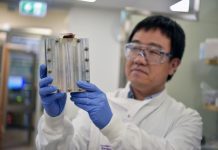
La Trobe University has launched a new Australian Research Council (ARC) Research Hub aimed at accelerating the nation’s molecular biosensors sector, with an emphasis on boosting advanced manufacturing capabilities and bridging the gap between research and industry.
The ARC Research Hub for Molecular Biosensors at Point-of-Use (MOBIUS) was officially opened on 15 August by Victorian Senator Lisa Darmanin, following a $4.7 million ARC grant awarded last year, the university said in a news release.
The five-year initiative is led by La Trobe University in collaboration with five other Australian universities and more than 20 industry partners.
La Trobe University Chancellor, the Hon John Brumby said the Hub demonstrated the university’s mission to conduct impactful research that addresses pressing industry challenges while fostering economic growth.
“Major industry-academic partnerships like MOBIUS leverage science and technology to drive economic growth, accelerate commercial outcomes and enhance industry competitiveness,” Mr Brumby said.
Projects already underway include a pocket-sized sensor enabling first responders to identify biological threats using a mobile phone, and a portable, low-cost test for on-farm detection of mastitis in cattle to improve herd health and revenue.
Such innovations, La Trobe noted, align with broader goals of enhancing Australia’s sovereign manufacturing capabilities.
Molecular biosensors are devices that detect and measure specific molecules in samples such as food, air or blood, with common examples including freshness indicators, allergen tests and breathalysers.
The COVID-19 pandemic highlighted the country’s reliance on imports for such technology, particularly when rapid antigen tests had to be sourced from overseas due to the absence of local manufacturing capacity.
Professor Conor Hogan, La Trobe academic and MOBIUS Director, said the Hub’s goal is to accelerate the translation of research into practical, market-ready products.
“We are partnering with industry to develop the next generation of biosensors that use new materials and ways of detecting molecules so that they are user-friendly, affordable and accurate,” Professor Hogan said.
Traditionally used in healthcare, biosensing technologies are now finding applications in detecting chemical threats, conducting roadside drug tests, monitoring beehive and cattle health, and assessing food freshness and safety.
According to La Trobe, the expansion of this sector will deliver substantial economic and industry benefits through commercialisation, innovation and manufacturing job creation.
“The ability to take measurements wherever needed rather than sending a sample to a laboratory has already had profound impacts for many Australians,” Professor Hogan said. “MOBIUS will create impact in diverse fields such as food, biosecurity and health.”



















